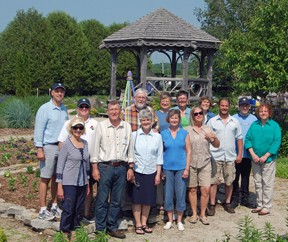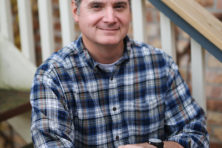New Class of Master Gardeners
- Share
- Tweet
- Pin
- Share
Some who spend time gardening speak of metaphorical green thumbs. And then there are those who literally display green fingers as well, testifying to time spent pulling weeds. If you belong to that latter group, you may be a good candidate for the Master Gardener program, as the training includes not only classroom instruction but volunteer gardening.
At a picnic on June 23 at The Garden Door, 24 gardeners who have completed this year’s training program were recognized as new members of the Door County Master Gardener Association.

The new Door County Master Gardeners gathered for a picnic at The Garden Door on Sunday, June 23. They are, from left, front row, Donna Hake, Scott Thies, Linda Zolnosky, Shirley Ziman, Linda Lambert, Tim Kazmierczak, Pat Christman and Zach Christman. Back row, Paul Hamlin, Phil Block, Mike Zolnosky, Susan May, Bonnie Rankin and Deborah Javurek. Missing from the photo: Jim Baxter, George Cassidy, Holly Green, Dora Leonardson, Marie Larson, Jerry Saballus, Vikki Saballus, Lynn Truckey, Sandy Vandertie, Zoe Wesolowski. Photo by Jim Lundstrom.
Master Gardeners are active in all 50 states, part of a nationwide program that advises and educates the public on various aspects of gardening and horticulture. Groups are affiliated with university extension offices. University, local industry and community specialists provide training for new members.
Those wishing to become members must complete 36 hours of education, 24 hours of volunteer time, and pass an open-book exam. Once the certification is complete, Master Gardeners must continue 10 hours of education and 24 hours of volunteer work each year to retain their status.
The DCMGA supports a number of ongoing projects, including maintaining The Garden Door (a public garden situated on the grounds of the UW Peninsular Research Station a few miles norht of Sturgeron Bay on Highway 42), offering the yearly spring Plant Sale, and the Youth Program.
Graduates of the DCMGA class of 2013 speak highly of their training experience. One of them, retired attorney Jim Baxter, said, “I’ve gardened for a long time, always with my wife. I wanted to see what I could learn rubbing shoulders with good gardeners and meeting new people. I’ve been successful on both counts”
“The educational part was surprisingly good,” he continued, as the organization includes “quite a number of expert gardeners.”
He and his wife maintain a winter home in Whitefish Bay (Milwaukee County) and a summer place in the Town of Sevastopol. Subsequently they have downsized their city gardening and focused on developing their “pretty wild” Door County property that includes both vegetable and flower gardens, but with a focus on providing a habitat for birds and beneficial insects.
She is not a Master Gardener, Baxter said of his wife. “Just a good gardener!” Their retirement goal is “to keep chugging, to keep at it!”
Phil Block’s son suggested that he look into becoming a Master Gardener because of his interest in gardening. “Last summer I toured The Garden Door, found out about the Master Gardener Program, and I was hooked!”
A retired middle school science teacher, he and his wife moved from the Chicago area to a five-acre wooded property near Egg Harbor a year and a half ago. He found the training program “an opportunity to meet a wonderful group of people with a common interest in gardening.”
He is interested in developing a landscape that blends with the forest, in learning which plants are best suited for the soil and environment, and in minimizing the present lawn. Last fall he and his wife planted 500 bulbs and enjoyed their bloom this past spring.
The challenge that he finds as a gardener is “the more you learn, the more you realize how little you know.” But the Master Gardener Program offers “the opportunity to discover incredible resources in the county and state.”
Seven years ago former soccer-mom Deborah Javurek and her husband moved to Sturgeon Bay after having vacationed in Door County when their children were young. Gardening “is a part of me,” she said. “Since I was I kid I have been drawn to digging in the dirt, planting seeds and watching them grow.”
Javurek found the Master Gardening group “very welcoming, alive, informed, sharing – a wonderful group to be associated with and so much to learn!”
As with other transplanted gardeners, she is interested in learning the plants that do well on the peninsula. Her goals include reducing the size of her lawn by 85 percent, and converting the space “gradually, section by section, to a living yard that attracts birds, butterflies and pollinators.” She is especially interested in native plants, and would like to create an herb garden, maybe an old-time medicinal garden.
“I have to slow down and appreciate what I can do!” she laughs. “I have to be patient!”
Tim Kazmierczak brought to the Master Gardening Program a degree in horticulture and a proximity to The Garden Door; he resides at and works for the USDA Potato Gene Bank at the UW Peninsular Research Station. His job is to cultivate and maintain the vast potato species inventory and to be in charge of greenhouse operations.
He was able to firsthand “observe the Master Gardeners, a well-organized group of people” who do “a tremendous amount of work” and have “a broad talent range, an amazing group of people who benefit the community, one of the best volunteer organizations” he has seen.
His relationship with the Master Gardeners was mutual, he said. “I learn a tremendous amount from them on how to grow plants,” but at the same time, as a professional horticulturalist, “I can also give them my perspective.”
Kazmierczak and his wife grew up in Chicago and came to Sturgeon Bay by way of Spokane, Washington. A professional horticulturalist, he is always looking for new varieties of vegetables. And as a gardener he has developed a philosophy of life: “Weeds always come up,” and must be dealt with, an on-going challenge to a perfect garden. “And weeds come up in life!”
Because she wanted to learn more about plants in the area and because she hoped to meet people who like the same things, Sue May joined the Master Gardening Program.
Originally from Iowa, May is a retired United Methodist Minister who is now a realtor and owns with her husband a piece of property in Sevastopol Township.
“What I like most was the sharing of information,” she said, “not just lectures but solid information, broken down into pieces you could understand,” along with the opportunity to ask questions of “highly educated, knowledgeable people.”
A challenge for her was “fitting in all the requirements around a job.” However, she found the organization flexible and accommodating.
She is especially interested in flower and herb gardens, as she doesn’t have a good spot for vegetables. “I currently have a wild flowerbed that is more wild than flowers!” she laughed. “I plan to replace it with something I can be more proud of!”
A native species herself, Bonnie Rankin was born and raised in Southern Door between Forestville and Maplewood, and worked as a human resources manager in Algoma.
“After I retired, I joined the Sturgeon Bay Garden Club,” she said, and then took a Learning in Retirement class with DCMGA President Kathie Vavra that included a field trip to The Garden Door. “Kathie was so inspiring,” she recalled. “That was all it took! The enthusiasm was contagious.”
Rankin enjoyed the weekly meetings, finding that if she had a question, “it didn’t take long to find an expert in the field to ask.” She especially liked working in the greenhouse when she couldn’t be outside. “It gave me a lift as to what was coming!”
At home she tends several flower gardens while her husband maintains a pond with 10 koi. “I plan to continue more of what I am doing,” she said, “and I’ll enjoy working at The Garden Door, the butterfly garden and the cactus garden – different areas that I have been exposed to.”
Interested candidates for the DCMGA must complete a written application (available online at dcmga.org or at the University Extension Office in Sturgeon Bay), pay a fee of $70 and have a background check.
Classes begin in January, meeting once a week, and end in spring. Students are provided with lists of volunteer opportunities.
For more information regarding the program visit dcmga.org, or contact DCMGA President Kathie Vavra at [email protected].

